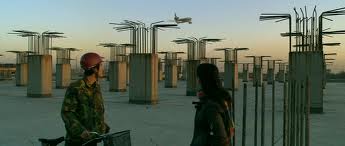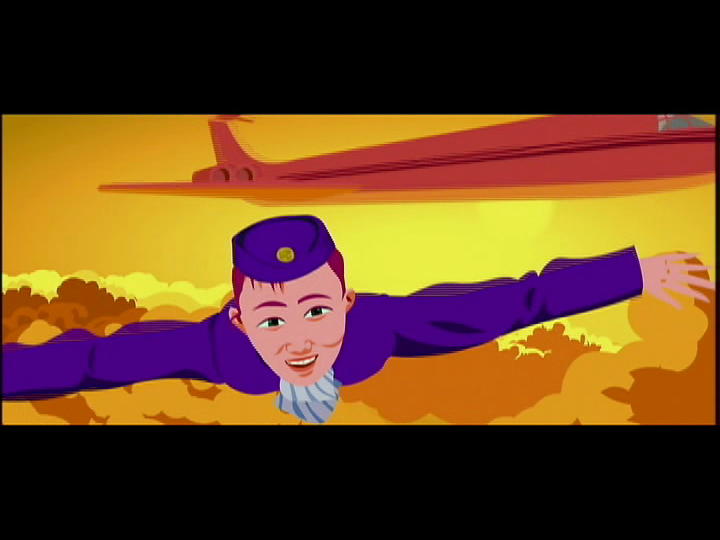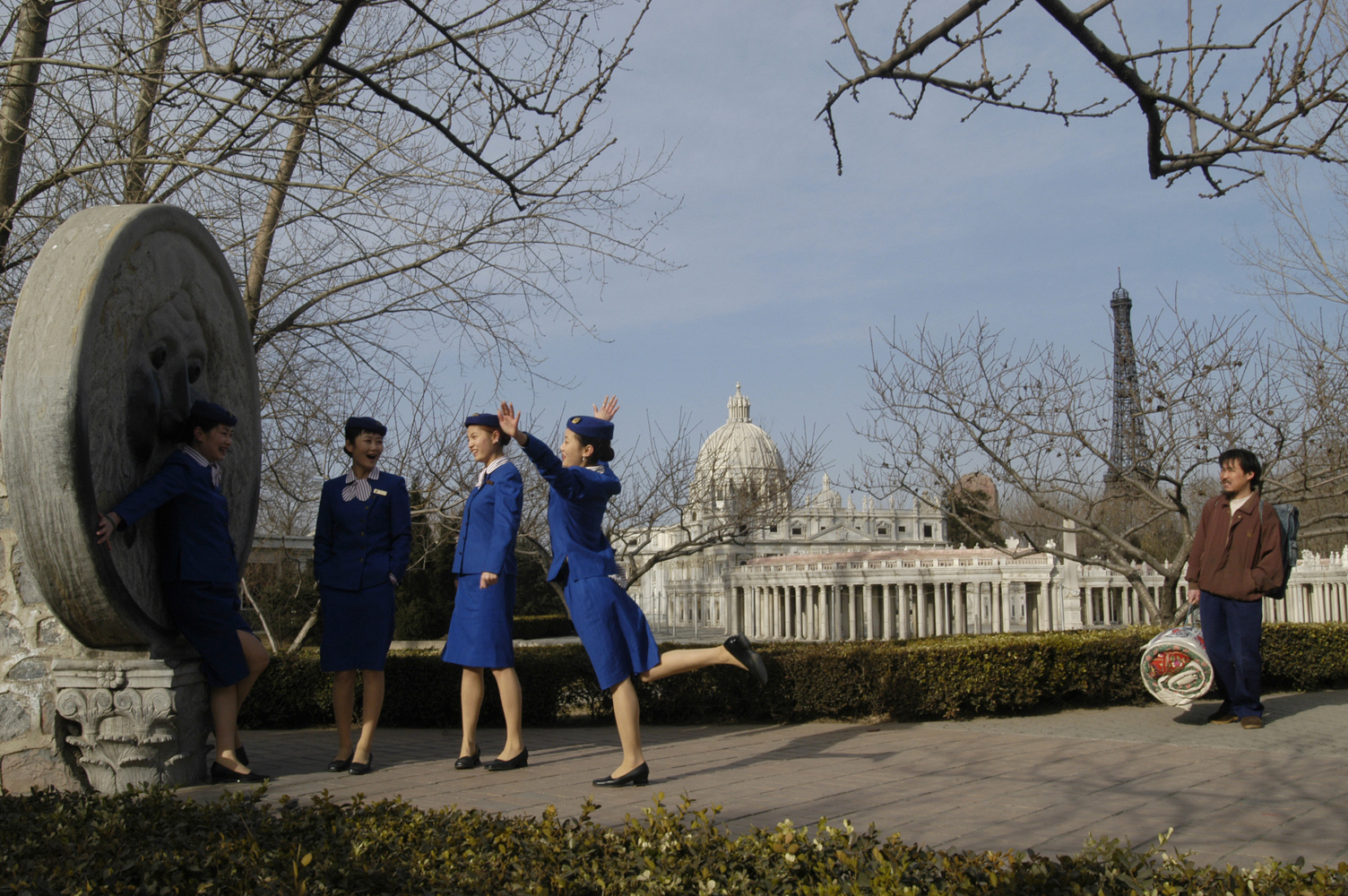From the Chicago Reader (July 29, 2005). — J.R.
The World
**** (Masterpiece)
Directed and Written by Jia Zhang-ke
With Zhao Tao, Chen Taishen, Jing Jue, Jiang Zhongwei, Huang Yiqun, Wang Hongwei, Liang Jingdong, Ji Shuai, and Alla Chtcherbakova
The title of Jia Zhang-ke’s 2004 masterpiece, The World — a film that’s hilarious and upsetting, epic and dystopian — is an ironic pun and a metaphor. It’s also the name of the real theme park outside Beijing where most of the action is set and practically all its characters work. “See the world without ever leaving Beijing” is one slogan for the 115-acre park, where a monorail circles scaled-down replicas of the Eiffel Tower, the Taj Mahal, London Bridge, Saint Mark’s Square, the Leaning Tower of Pisa, the Pyramids, and even a Lower Manhattan complete with the Twin Towers. Extravagant kitsch like this may offer momentary escape from the everyday, but Jia is interested in showing the everyday activities needed to hold this kitsch in place as well as the alienation in this displaced world — and therefore in the world in general, including the one we know.
Jia, with his choreographed wide-screen long takes in long shot, may be the best cinematic composer of figures in landscapes since Michelangelo Antonioni. And as with Antonioni, the disconnections count more than the connections. The only two people in The World who get married bicker constantly, mainly about his paranoia regarding her mobile phone; when he wants to convey his despair he calmly sets his jacket on fire.
These characters are both dancers in the park’s stage shows, as is the heroine, Tao — one reason the film suggests a backstage musical (the hypnotic score is by Lim Giong, who’s scored and appeared in several Hou Hsiao-hsien films). It’s also a story about the difficulty of sustaining relationships: Tao has a boyfriend, Taisheng, a security guard at the park who followed her to Beijing and turns out to be less than loyal. It’s also a tale about exile: all the characters are from elsewhere — and most, like Jia himself, are from Fenyang, a rural town in a northern province — and all feel alienated, though the most passionate friendship we see is between Tao and a Russian dancer, Anna, neither of whom knows a word of the other’s language. Some parts of the film even qualify as animated adventures: cartoon reveries about freedom and flying — personal fantasies within the impersonal fantasies of the theme park — grow out of personal text messages sent via cell phones. (According to the New York Times, over a quarter of China’s 1.3 billion people own cell phones.) In contrast to the grandiloquent park setting, the backstage spaces where the characters live are uniformly seedy, congested, and bunkerlike, suggesting some of the impetus behind their fantasies.
The World is full of such paradoxes. Its writer-director, only 35, is the most talented and one of the most respected in mainland China, but this feature, his fourth, is his first government-approved movie and the first to show there in theaters. (It’s also only his second film to get a U.S. release, after the 2002 Unknown Pleasures, though the DVD of his greatest film, 2000’s Platform, will be released here in August.) It offers a far bleaker and more critical view of contemporary China than any of his others, including the plaintive 1997 Pickpocket. The version playing all over China is at least 20 minutes shorter than the one showing abroad, but it was cut for business reasons — to make room for another daily screening.
One reason The World is such a potent companion piece to Platform, which views the Cultural Revolution over many years from the vantage point of a traveling theater troupe, is that it can be said to describe another failed cultural revolution — capitalism, seen from the vantage point of Chinese communism. As Chinese-film specialist Shelly Kraicer puts it, “Platform showed a China lost in time. The World shows the same society lost in space.”
Jacques Tati’s Playtime (1967) also shows a modern urban society lost in space, where the reflections of familiar Paris monuments like the Eiffel Tower on the glass doors of anonymous skyscrapers offers a kind of inverted version of Jia’s park and its displacements. Tati found a utopian solution to his characters’ alienation that bypassed intimacy and depended on creative and festive uses of shared public spaces. But that was before mobile phones and the Internet replaced public spaces with virtual private spaces. This film has its share of partying and celebrations, and we even see workers in a sweatshop outside the park dancing during a break. But their low-tech factory specializes in reproducing chic fashions from Europe, suggesting simulacra related to those of the theme park.
In a world where so much is artificial and untrustworthy, human relations are bound to be unstable. Taisheng starts cheating on Tao with a factory supervisor whose husband illegally emigrated to Paris eight years earlier, and the most glamorous party Tao attends, a karaoke bash in a nightclub, proves to be a gateway into prostitution for some of the dancers. When Tao finds Anna there — she’s been conned out of her passport to make her more exploitable — their wrenching tears of mutual recognition and commiseration tell us everything we need to know. The only comparable grief we see is when a company pays off a family whose son has died in an industrial accident. Both sorrowful transactions of cash for flesh summarize the film’s pessimism about capitalism.
The various costumes and ersatz nationalities Tao puts on make her another series of simulacra. At one point, dressed as a flight attendant, she makes out with Taisheng in the pilot’s seat of a grounded airplane that usually serves as a park attraction. It’s typical of the film’s multiple displacements that a little later we see a cartoon version of her in this outfit flying over the park, and that much later we hear her saying she doesn’t know anyone who’s ever flown on a plane — at the very moment that a plane carrying Anna passes directly overhead.
Flawed only by its abrupt and stylistically awkward ending, The World is a tragic, visionary work — a global newspaper that somehow catches our muddled drift in all its surreal splendor. Maybe its biggest achievement is that it actually lives up to its title.





